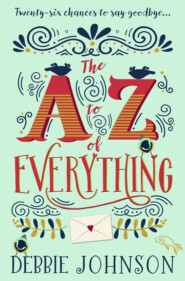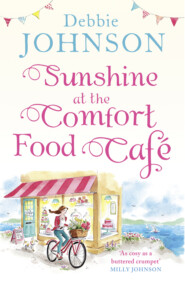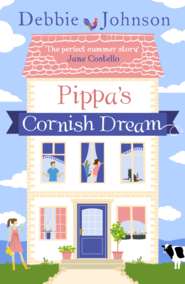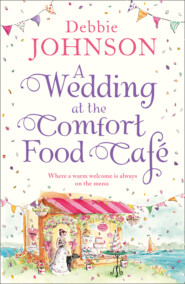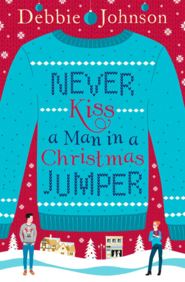По всем вопросам обращайтесь на: info@litportal.ru
(©) 2003-2024.
✖
Coming Home to the Comfort Food Café: The only heart-warming feel-good novel you need!
Автор
Год написания книги
2019
Настройки чтения
Размер шрифта
Высота строк
Поля
“Who are you texting?” I ask, still slightly concerned about the invasion of the teenaged ninjas.
“Donald Trump,” she replies, deadpan.
“Oh. What’s he saying?”
“He says you’re a loser. And that you have worse hair than him.”
I glance into the rear-view mirror.
Donald may have a point on both counts.
Chapter 8 (#ulink_5dab3dab-dc55-57d8-af61-b6ad911dc24e)
I’ve been in this part of the world before, but today it feels like I am seeing it with fresh eyes. Today, I am not visiting for a holiday, or here for a day trip. Today, I am arriving at my new home.
Maybe for that reason, everything feels especially vivid and bright.
It’s the beginning of September, and though the sun is still shining, the temperature is lower; as though Mother Earth is trying to prepare us for the change in season. As we leave the sprawl of modern life behind us and disentangle ourselves from the congested snake of the roads around Bristol, everything seems to slow down.
The roads themselves become smaller, less busy. The cars slowly change character: less nippy city-mobiles and more tractors. Fewer flashy number plates and more function. We see less signs for McDonalds and services and more for country pubs with quaint names: The Thatched Cottage, The Jolly Sailor, The Fisherman’s Rest.
The surroundings grow more green, the fields stretching out endlessly around us, the hills and valleys curve and undulate like verdant streamers. The sides of the roads are edged by hedges and gnarled trees and wildflowers in their final bloom; by old-fashioned red post boxes and cattle grids and turn-offs into distant farms.
We stop seeing places that sell Krispy Kremes and pizza, and start seeing small stands at the side of the fields, solitary ladies reading books by tables of fruit and fresh bread; a booth of free range eggs and an honesty box next to them; we see unfamiliar place names and men perched on combine harvesters and sunlight dappling through the arched boughs of the trees stretching overhead. We see a whole different world starting to unfold.
Martha pretends not to be interested, but I can tell she’s noticing everything. Taking it all in, digesting it. Whether it makes her want to vomit or rejoice is impossible to figure out, her face is completely dead and still, carefully schooled not to show any emotions at all.
I try not to dwell on this, to worry if I’ve broken her. If I’ve dampened down her resistance to the point where she has nothing left. If I’ve done exactly what Kate didn’t want me to do, and forced her into a shape she doesn’t fit.
We came to Dorset and Devon and Cornwall a lot when she was little. When she thought that hunting for crabs in rock pools was the height of excitement.
Days of endless sunshine and sometimes endless rain but always endless fun. Me, her and Kate, free-wheeling around the countryside, traipsing along the coastal paths, singing in the car and dancing on the beach. I suppose we’d taken that for granted – everyone does. We all notice the disasters, and never make time to appreciate the small acts of happiness. Of companionship and laughter and ease.
Now, I’m making this drive in what feels like solitude. Martha has spoken little other than to tell me when she needed to stop for the loo, and has remained glued to her phone. I ponder throwing the phone through the window, hoping it might land in a field and get pecked to death by a flock of confused crows, but know that a digital detox would be pushing things too far. Depriving a teenager of Wi-Fi these days is cause for a call to Social Services.
I’m using the sat nav, and wish I could reprogramme the voice. If it’s going to be the only voice I hear, it’d be nice if it sounded a bit more friendly. Sat navs always seem very judgemental to me. Also, a bit rubbish – it completely misses the turn-off to The Rockery, the cottage complex we’ll be staying at, and I have to do a 78-point turn in a narrow country lane to retrace our route.
Martha, despite her silence, has clearly been paying attention.
“We’re nearly there,” she says, sounding full of joy and hope and optimism. Not.
“Yes, we are,” I reply, wrestling the steering wheel around and hoping for the best.
“You know it’s going to be really boring, don’t you?” she asks, finally deciding to look me in the face.
“I don’t know that, no. In fact it might be great. You’ll have a new college, and make new friends, and I’m sure there’ll be a lot to do.”
“Like what?” she asks, glumly, gesturing out at the beautiful countryside that surrounds us. “Go bird-spotting? Identify rare and unusual types of mushroom? And I don’t imagine I’ll be making many friends. People round here aren’t going to be like people in the city.”
That, I think, as I get us back on track and head down the same road again, is exactly the point – but I don’t actually say it. I pretend I’m concentrating on driving, and try not to imagine how many rare types of mushroom she could actually find if she put some effort into it. And whether any of them could be brewed up into a mind-expanding cup of tea.
“People here will be just as interesting as people in the city, so don’t judge until you’ve met them,” I eventually say, risking a sideways glance at her. Her nose ring is glinting in the sunlight, which weirds me out a bit.
“Well, I bet there aren’t any black people, for a start!” she snaps back.
I ponder this, and decide that she has a point. Bristol is big and bustling and cosmopolitan; all forms of human life exist there. It’s where she’s grown up, and what she’s used to. This … isn’t. She’d have probably loved living in the countryside when she was a little kid – but right now, she’s 16, and I’ve dragged her away from an exciting fleshpot of earthly delights and different cultures to what she clearly sees as some kind of hell dimension.
“Probably not,” I admit, squinting my eyes as I look for the turn-off again. It seems like someone’s moved it. “As this is a small rural village in the West Country. But that doesn’t mean the people here won’t be fun, or interesting, or have their own stories to tell.”
I finally spot the turning, and do a sudden heave to the right, forgetting to change down to second gear and giving us both a scare as we wobble. There is a pause, and a mutually agreed silence, while we both thank the God of Crap Driving for letting us get away with that one.
I look around, driving at one mile an hour now, tires crunching slowly on the gravel path as we head for a small carpark. I see one of those wooden summer houses, which seems to be a games room, with a ping pong table and air hockey and stacks of board games. I see a playground, with swings and a slide and a small climbing frame with rope netting hanging from it. And I see a path through two stone walls, leading us into the main cottage complex.
It all looks pretty, and well-kept, and welcoming. The ‘welcoming’ part may, of course, be down to the fact that there is a giant hand-painted banner attached to the wall, saying, in rainbow and glitter lettering, ‘Welcome to Budbury Martha and Zoe!’ It’s flapping in the gentle breeze, and each time it does, a small flurry of glitter flies off and floats away in a bright cloud, like Tinkerbell’s exhaust fumes.
I stop the car, and turn off the engine. It hums and buzzes for a few seconds, then goes quiet. This is it, I think. We’re here. We made it in one piece, just about.
Martha doesn’t seem quite as relieved, predictably enough. She is staring at the pretty banner as though it is the most disgusting and repulsive thing she’s ever seen. As though it’s releasing the Ebola virus into the sky, not multi-coloured glitter.
“I think you’re wrong,” she says, horrified. “I don’t think they’ll be interesting, or fun. I think …”
She pauses at this point, as I have ignored her and got out of the car. I straighten my arms into the sky, and stretch my legs, and breathe in the clear air. It’s late afternoon, still bright, but with a cooler edge that makes me wish I had a cardigan on. I can hear laughter and chatter from the other side of the wall, and feel suddenly nervous.
I wasn’t expecting a welcoming committee – or people at all, truth be told. I’d hoped to slink in, unpack, lock Martha in her dungeon, and maybe sleep for an hour. I’m not the world’s most skilled in social situations – not beyond one to one anyway. I tend to clam up a little; retreat into a self-protective shell. ‘Turtle Up’, as Kate used to call it.
So, I’m nervous – about meeting these people, and, more honestly, about these people meeting me. Kate was the only person who ever really understood me – she never judged, and she always got it. She always knew why I sometimes did the things I did or behaved in certain ways; she just instinctively figured it all out, even quicker than I did. Now I find myself out of my comfort zone, without Kate, and in charge of a teenager who probably wants to stab me in the back as I walk towards the path.
“I think,” she says, continuing her one-sided conversation, “that they are going to be dull. And boring. And completely and utterly … normal.”
Her voice falters on that last word, trailing off into a stunned silence. I can’t say that I blame her.
It’s hard to maintain use of the word ‘normal’ when you’re looking at Dracula, Frankenstein and The Mummy engaging in a hula-hoop competition.
Chapter 9 (#ulink_af0de83e-ae30-5873-9003-a915a8fdb440)
As we emerge onto the path, we see a green space, lawned over apart from a central bedded area with a water feature, draped with flowers. The cottages are arranged around the green, in pairs and terraces and one big house on its own, all built with pretty pale stone. So far, so normal.
It’s the people on the green that change it into something weird. The people who are all, so far as I can see, dressed in various types of horror outfits. There are a couple of vampires with cloaks and teeth and blood down their faces; a fully wrapped and humungous Mummy; a hairy-headed werewolf, and a steampunk-type Victorian who may or may not be Dr Jekyll or Mr Hyde. There is a small pack of young zombies, and a boy with fake bolts through his head and green face paint. It feels a bit like we’ve walked into an impromptu meeting of the Hammer House of Horror fan club.
Steampunk Dr Jekyll is a strikingly tall young woman with flaming pink hair, the Werewolf is handing out bottles of cider, and there’s a tiny raisin of an ancient old lady rocking a Catwoman suit. Not usually a horror character, but pretty scary given her age. Running around her feet is a leggy black Labrador, complete with devil horns. Even the dog is evil.
I take a couple of hesitant steps forward, Martha now lagging behind in understandable confusion. Possibly fear as well. It’s not too late, I tell myself; we could jump back in the car and be home by tea-time…
Before I have the chance to act on that impulse, we are spotted. One of the monsters – a full on Bride of Dracula, around six-foot-tall and frankly terrifying – sees us, and waves.
“Hello!” she bellows, the word slightly distorted by her fake fangs. At least I assume they are fake. “Come on over – we don’t bite!”
That line gets a laugh from the rest of them, and I take tiny steps in their direction. I tell myself it’s to give Martha time to recover from the shock, but that would be fibbing – I’m feeling a bit discombobulated myself.






